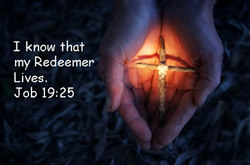In my church we sing a beautiful hymn called “I Know That My Redeemer Lives,” based on a famous passage from Job 25:
25: 25
For I know that my redeemer liveth, and that he shall stand at the latter day upon the earth:
25: 26
And though after my skin worms destroy this body, yet in my flesh shall I see God . . .
In the hymn, and in most of our readings of this passage, the Redeemer is God. God will uplift us and defend us, yada yada. In some highly christianized readings of Job, like the highly messianic reading we see in the hymn text, the Redeemer is Jesus. Hermeneutically, that is of course a stretch. But in either case, the point of the popular interpretation is clear: a loving God is going to save us from our trials and put things right in the end.
In the actual book of Job, though, that perspective is not very evident. In fact, the Hebrew word that Job uses is not “redeemer” so much as “avenger” or “champion.” Job evokes a legal precedent in which a wronged party could call upon an established, wealthy and powerful family member to act as a kind of defense attorney to plead his case. This avenging benefactor could also be asked to discharge debts in the defendant’s name, or obtain vengeance for the family if someone had been raped or robbed or murdered.
It’s clear that Job wants someone to take up his case. What’s not clear is that this redeemer/avenger is supposed to be God. In fact, God seems to be on the other side of the legal aisle — God is the party who has created the intolerable situation, not the hero Job expects to fix it. Job appears to be almost shaming God, and in chapter 17 we saw Job basically giving up hope that his case would ever reach God’s ears.
As a Christian, I love the messianic reading of this passage, and find hope in the writer’s affirmation that despite the destruction of the body, yet in our flesh we shall see God. And yet. The darkness and ambiguity of these verses invite a different reading altogether, and in painful times I am also glad that such an interpretation exists.
I have a flicker of peace just knowing that it’s out there. That it’s OK to put God on trial now and again, and to hope for some kickass demigod avenger to storm the heavens on your behalf and screech, “Nobody deserves to be in pain like this! Where the hell are you, God?!” That we don’t have to be so quick to find the meaning and the sweetness and the light.
Thanks, Book of Job.
Sat 1/15/11
#Twible Job 17: Job prays to G for relief from suffering. It might also be nice if G saw fit to smite his so-called friends. Just an idea.
Sun 1/16/11
#Twible Job 18: FOJ #2 strains his head w/syllogism: “If G punishes the wicked, & Job is suffering, THEREFORE Job is wicked. It’s so clear.”
Mon 1/17/11
#Twible Job 19: “I know that my avenger lives. It’d be nice if I got justice before my flesh is ripped off, but I guess I can’t be picky.”
Tues 1/18/11
#Twible Job 20: FOJ #3 starts getting offended & reminds Job that the wicked never go unpunished. Job is rolling what remains of his eyes.
Wed 1/19/11
#Twible Job 21: Job: “Actually, wickedness goes unpunished often. Exhibit A is here in front of me. Remind me why you’re still here, liar?”
Thurs 1/20/11
#Twible Job 22: And it’s Round 3 w/the 3 FOJs! FOJ #1 goes for the jugular & says Job oppressed widows & the poor. Them’s fightin’ words.
Fri 1/21/11
#Twible Job 23: Job mutters to G about how an upright person who obeyed the law ought to be able to lodge a proper complaint. So there.


